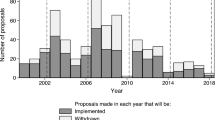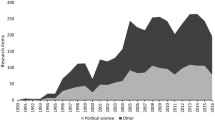Abstract
A “walk up” survey conducted in the city of Caen between the two rounds of the 2017 French presidential election shows that more than one elector in six would like to have changed their first-round vote. Some voters faced a dilemma between strategic and expressive voting. The analysis of their motivation reveals that both types of regrets were present: many respondents wished that they had voted more strategically, and just as many wished that they had voted less strategically. Many participants also considered that they would rather have cast a blank vote in the first round rather than choosing a particular candidate.
Similar content being viewed by others
Notes
The authors thank Margot Calbrix, Frédéric Chantreuil, Clémence Christin, François Durand, Kevin Fourrey, Alexis Léon and Vincent Merlin for their help in conducting the field survey.
No candidate for the French Presidency has ever been directly elected in the first round.
Blank ballot papers, although counted separately from spoiled ballot papers since 2017, do not influence the result of the election.
The low number of votes for some candidates could raise issues relating to the significance of results; but the overall trend, that potential change of voting is proportionally higher for electors of small candidates than for those of viable candidates, remains a significant finding.
References
Baujard, A., H. Igersheim, I. Lebon, F. Gavrel, and J.F. Laslier. 2014. Who is favored by evaluative voting: an experiment conducted during the 2012 French presidential election. Electoral Studies 34: 131–145.
Blais, A. 2004. Strategic voting in the 2002 French presidential election. In The French voter. French politics, society and culture series, ed. M.S. Lewis-Beck. London: Palgrave Macmillan.
Blais, A., R. Young, and M. Turcotte. 2005. Direct or indirect? Assessing two approaches to the measurement of strategic voting. Electoral Studies 24: 761–765.
Bol, D., A. Blais, and J.-F. Laslier. 2018. A mixed-utility theory of vote choice regret. Public Choice. https://doi.org/10.1007/s11127-018-0571-z.
Cox, G. 1997. Making votes count. Strategic coordination in the world’s electoral systems. Cambridge: Cambridge University Press.
Dolez, B., and A. Laurent. 2010. Strategic voting in a semi-presidential system with a two-ballot electoral system. The 2007 French legislative elections. French Politics 8(1): 1–20.
Pons, V., and Tricaud, H. 2017. Expressive voting and its cost: evidence from runoffs with two or three candidates. Harvard Business School Working Paper, 17–107.
Author information
Authors and Affiliations
Corresponding author
Appendices
Appendix 1: Sample weighting
Candidates | Distribution of questionnaires | Distribution of votes in Caen | Weight | ||
|---|---|---|---|---|---|
Votes | Percentage | Votes | Percentage | ||
N. Arthaud | 5 | 0.32 | 261 | 0.57 | 1.77 |
F. Asselineau | 6 | 0.38 | 280 | 0.61 | 1.59 |
J. Cheminade | 2 | 0.13 | 67 | 0.15 | 1.14 |
N. Dupont-Aignan | 37 | 2.36 | 1389 | 3.01 | 1.28 |
F. Fillon | 187 | 11.92 | 9395 | 20.36 | 1.71 |
B. Hamon | 245 | 15.62 | 4685 | 10.15 | 0.65 |
J. Lassalle | 7 | 0.45 | 245 | 0.53 | 1.19 |
M. Le Pen | 31 | 1.98 | 4709 | 10.21 | 5.17 |
E. Macron | 528 | 33.65 | 13,472 | 29.20 | 0.87 |
J.-L. Mélenchon | 467 | 29.76 | 10,534 | 22.83 | 0.77 |
P. Poutou | 20 | 1.27 | 547 | 1.19 | 0.93 |
Blank vote | 34 | 2.17 | 559 | 1.21 | 0.56 |
Total | 1569 | 46,143 | |||
Appendix 2: Per candidate analysis
Candidates *Viable candidate | N. Arthaud (%) | F. Asselineau (%) | J. Cheminade (%) | N. Dupont-Aignan (%) | F. Fillon* (%) | B. Hamon (%) |
|---|---|---|---|---|---|---|
Motivation of vote | ||||||
Expressive/expressive and strategic | 100 | 83.33 | 50 | 83.78 | 79.14 | 91.84 |
Part. expressive/no better | – | 16.67 | – | 8.11 | 3.74 | 2.86 |
Strategic/against | – | – | 50 | – | 14.44 | 2.86 |
Other/no response | – | – | – | 8.11 | 2.67 | 2.45 |
Voters who would change their vote | 40 | 33.33 | 50 | 32.43 | 17.65 | 22.45 |
Potential alternative vote focused toward | ||||||
Viable candidate | 50 | 50 | 100 | 75 | 3.03 | 80 |
Non-viable candidate | – | 50 | – | 16.67 | 66.67 | 0 |
Blank vote or no vote | 50 | – | – | 8.33 | 30.30 | 20 |
Candidates | J. Lassalle (%) | M. Le Pen* (%) | E. Macron* (%) | J.-L. Mélenchon* (%) | P. Poutou (%) | Blank vote (%) |
|---|---|---|---|---|---|---|
Motivation of vote | ||||||
Expressive/expressive and strategic | 42.86 | 67.74 | 50 | 70.02 | 75 | 11.77 |
Part. expressive/no better | – | – | 5.11 | 1.71 | – | – |
Strategic/against | – | 29.03 | 40.91 | 24.84 | 10 | 2.94 |
Other/no response | 57.14 | 3.23 | 3.98 | 3.42 | 15 | 85.29 |
Voters who would change their vote | 28.57 | 19.35 | 12.12 | 15.02 | 20 | 26.47 |
Potential alternative vote focused toward | ||||||
Viable candidate | 50 | 50 | 37.5 | 19.72 | 75 | 55.56 |
Non-viable candidate | – | 16.67 | 43.75 | 45.07 | – | 22.22 |
Blank vote or no vote | 50 | 33.33 | 18.75 | 35.21 | 25 | 22.22 |
Rights and permissions
About this article
Cite this article
Courtin, S., Laslier, JF. & Lebon, I. The 2017 French presidential election: Were voters happy with their first-round vote?. Fr Polit 16, 439–452 (2018). https://doi.org/10.1057/s41253-018-0070-0
Published:
Issue Date:
DOI: https://doi.org/10.1057/s41253-018-0070-0




